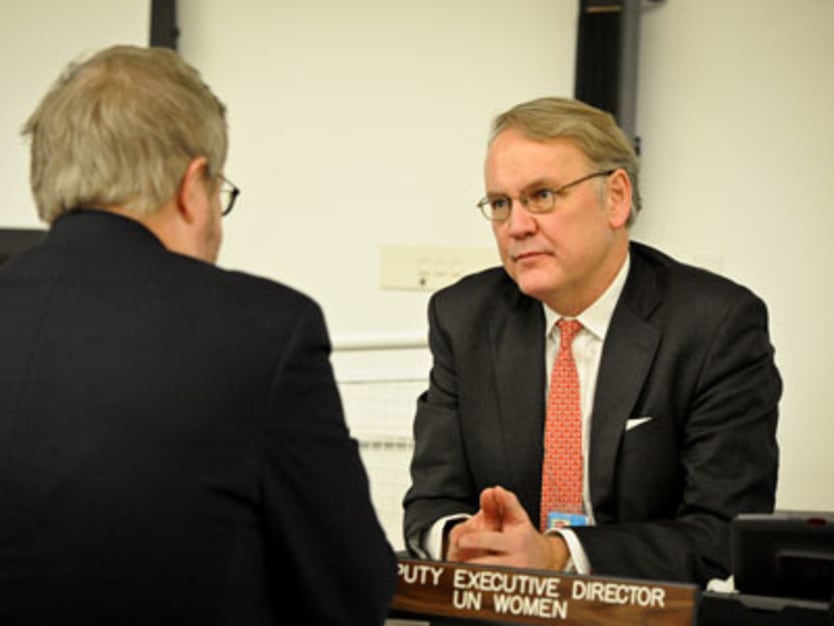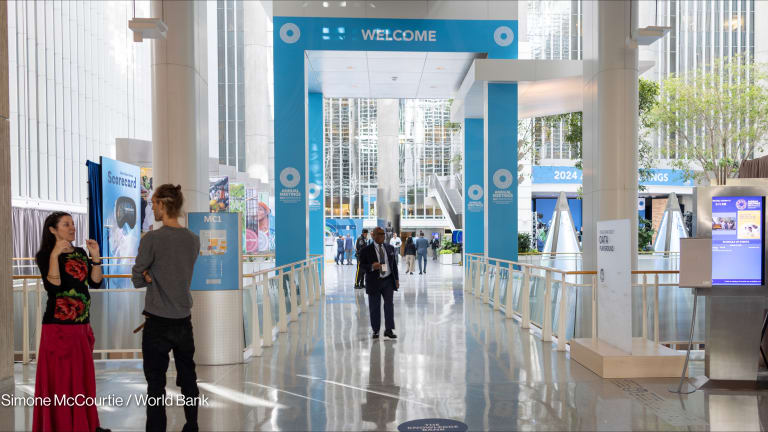
Who will be U.N. Women’s next chief? Observers and staffers of the U.N. gender rights entity may have to wait a few more months to find out, suggests one of its top officials.
“I think it will be fair to think within three months” there will be a new executive director, John Hendra told Devex.
The post was vacated in March after Michelle Bachelet resigned to run again for president in her native Chile. Soon after, U.N. Secretary-General Ban Ki-moon designated Hendra’s co-deputy executive director, Lakshmi Puri, as acting head of the agency.
To determine who will officially replace Bachelet, Hendra said he expects the secretary-general to reach out to member states and the hope is that Ban will make a selection “as soon as possible.”
While awaiting who will lead it next, U.N. Women is also looking forward to the completion of the next development agenda framework — one that will replace the Millennium Development Goals after 2015. The framework, according to Hendra, is an important and transformative guiding point for the work of the organization as it continues to grapple with underfunding within the U.N. system, relative to other U.N. agencies, and the larger issue of the struggle to adequately fund gender equality and women’s rights across the board on a global level.
In this exclusive interview with Devex, Hendra discusses what’s at stake for gender equality now and in the coming years and what’s next for U.N. Women.
You attended the recent high-level panel talks on the post-2015 development agenda in Bali which were panned by some civil society activists for not focusing on inequality enough. What was your take on the dialogue and the concluding document, and how does it fall in line with the priorities for U.N. Women that you are trying to stake out for the new framework?
There is a myriad of consultations and so much energy is going into this process, but what was interesting for me in Bali was seeing how much consensus there is around what people are saying.
People are saying sort of five or six common things. One is that people very much want a transformative agenda. They don’t want to see business as usual, or just an MDG-plus-at-the-margins agenda. People are saying that the issues that are included in the MDGs are relevant, so don’t throw away the MDG framework and do everything you can to accelerate their achievement.
But, at the same time, people really want to see their new development framework go much further, and that is understandable. Particularly, they want to look at the challenges that are interconnected around climate change, food security, governance, around the shrinking job opportunities. So there is a view that the next global agenda needs to be more comprehensive.
I think people are also saying very much that the current growth model has to change. There is a vast environment that drives inequality and it really is not consummate with effective human development outcomes. … Inequality just comes through very strongly through these consultations.
And I think importantly people are really talking a lot about accountability. They want the new development agenda to be much more accountable — not in accountability functioning like within the MDGs, between donors and the developing countries, but between governments and their people.
What is important for us, I think, is that people feel the framework should be rights-based. It should be grounded in national rights commitments and, in particular, it should look at going beyond what the MDGs did, having those structural constraints … that have been driving discrimination and inequality, and I would say particularly in the case of gender.
People want universal agenda, they want a much more holistic agenda, with a stronger focus on accountability and inequality and the important thing is to make sure the next agenda is also more measurable.
That task is very daunting — it is a huge, huge challenge for governments around the world when they move into the intergovernmental negotiation process to meet these aspirations. At the same time, I think it is a reflection of the state of the world and people are looking toward a new development agenda with a certain level of seriousness to really see how these issues can be addressed.
Do you think this framework will lead to a new direction for U.N. Women, when it comes to your policy and work on the ground?
Definitely. It depends on what the framework looks like in the end. But certainly we are heavily invested in this process. It is really important, for us, the key dimensions of a stand-alone goal — which we sort of see as, in the very short form, focusing on choice and the safety of voice.
Choice would be to ensure that women’s choices are no more constrained than men’s, but to look at ensuring choice and capabilities around reproductive rights, but also in terms of access to income, and enabling them to make the best choices that they can for their lives. I think our work there around economic empowerment would be deepened.
Also, it is really about moving toward minimal conditions to promote gender equality and women’s rights. And so there’s the issue of violence against women and girls and the use of momentum from CSW 57 [57th session of the Commission on the Status of Women], and using this as a framework to really ramp up government efforts and international efforts to end violence against women… And finally, a voice in ensuring women have a greater voice in a public sphere, in terms of participation.
Given the issue of underfunding the U.N. Women has dealt with since its inception, do you see U.N. Women exploring different funding sources in the future, perhaps more outside of the U.N. system? How will you be addressing this problem?
There are two levels. First, there is underfunding in addressing gender equality and in women’s empowerment overall. So, I think when developing the next framework we really need to look at addressing financially gender equality concerns in a more serious way, how much money is going to gender concerns.
But also to look at this in a dynamic way. It is about addressing this policywise, gender in a robust, sort of conceptual way, across the country, across the government’s budget, across sectors, but then also doing it in a way that it is much more transparent and much clearer and in a way that empowers women’s organizations and civil society and other parts of society to really hold governments to account. I think similarly the new framework needs a much different type of accountability where citizens themselves can be much more involved in monitoring and holding governments to account for their investments or for their lack of investments.
Then, for us, as U.N. Women, a lot of things are in place, and there is a lot of important momentum, but resources are very much an issue. What we need to do is move toward a higher and sustainable level of core resources. I think, over time, there will be more and more opportunities to build a resource base of what they call noncore — more project- and program-related — around different sources types of partnerships.
One area we feel very hopeful about is public-private partnerships, really engaging with the private sector around on moving forward in a principled matter of gender equality and women’s empowerment, around areas that they also see as a kind of common interest. We have got a few partnerships now with a few companies, but I think that this is an area that there is great potential and a lot of dynamism.
What do you see as the role of the new executive in all of this?
I think that, first of all, we were extraordinarily lucky to have such a very visionary leader like Madam Bachelet, and the [secretary-general] said it right — she was the right person, at the right place, at the right moment, and at the right time.
That being said, we are moving into a different time. Post-2015 and in the next year of U.N. Women, we will have a very, very important role to play in terms of engaging these issues of women’s rights on the global map. I think the CSW showed the opposition and it showed some of the entrenched views. We are going to need a very strong and engaging and effective leader to continue to articulate on that.
And in terms of the organization’s priorities going forward, we are going to continue to generate a greater vision for women’s empowerment and women’s rights in the post-2015 discussion to move forward with a strategic plan and really to think about these relationships and these partnerships with the civil society organizations and with private sector partnerships.
Join the Devex community and access more in-depth analysis, breaking news and business advice — and a host of other services — on international development, humanitarian aid and global health.








